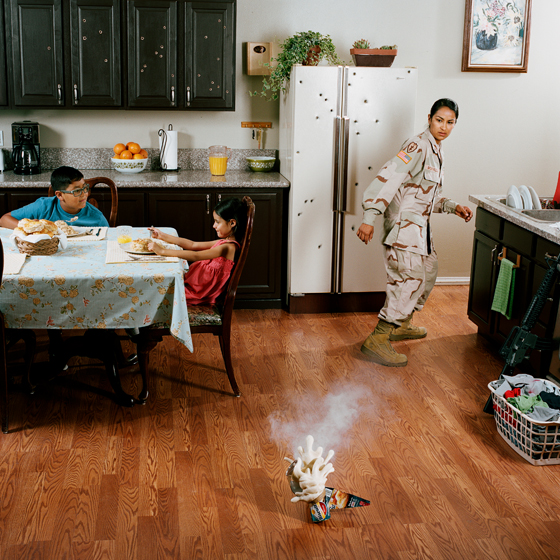|
 |
|
|||||||||
I deployed to Iraq as a specialist with a transportation company. We provided security for other military convoys. One of the incidents that I have most in my head was on a day when all of the roads were black, which means that you’re not able to go outside the wire to deliver anything unless it’s necessary—like water, food or ammunition. We were escorting a National Guard company on a road that people usually didn’t take because it was dangerous. We left around 4 am and took a wrong turn. We passed through this town, Najaf, where they have one of Iraq’s holiest mosques. That morning, they had brought down two Marine helicopters, so everyone was on their toes. I was the TC [passenger and vehicle commander] in the first gun truck, and my friend was the driver and we had our gunner on the back. Normally when you went through a town it was full of people. But there was no one. As our last gun truck was coming into the town, we started hearing bullets flying everywhere. And I can see them. I can remember every detail, every scent. I can remember the faces that I saw—the Iraqis, everyone. I can tell you what they were wearing. I can remember their positions, where they were peeking from, the guns they were using. I remember seeing an RPG [rocket-propelled grenade] that went just inches from our window—the driver saw it too. We looked at each other thinking we’re going to die and just kept shooting. We were issued seven magazines each and I don’t even remember switching our magazines that fast. When we finally got out of the danger zone and pulled into the camp, there was no one behind us. So we radioed back—it turns out that one of the drivers had been killed and the TC crashed the truck. It was a very hard day and it wasn’t even over because after we drove into the camp, they blew up a fuel tank and we were hit overnight. We were stuck there for three days. They called in the Marines to rescue us. When I came back, I got married right away, we got pregnant, and then I got out of the Army a few months after I had my son. I was a stay-at-home mom and home schooled our kids. I’m Mexican so we always have to keep our house clean—laundry’s made, food is ready, all of that good stuff. My ex-husband, he’s in the military, but I was never part of anything with him, military-wise. I felt like if I didn’t see it and I didn’t talk about it, it didn’t happen. I recently started going to the VA. I told the therapist that all I have trouble with now are balloons and Pillsbury cans. She asked what was wrong with balloons and Pillsbury cans. “Well, they pop!” Let’s say I’m making biscuits and gravy—it was one of my ex-husband’s favorite breakfasts. My heart will start to race because I know that I’m going to open that Pillsbury can anytime now. I’ll start doing everything else, making the gravy and sausage. Opening the can will be the last thing I do. I carefully peel a little piece of the wrapper, my hands start getting all sweaty, my heart starts to race. I’m clenching my eyes. I peel a little piece off of the can, and I throw it—it can land on the floor, it can land wherever—and I just run. And I scream. Then I hear the pop and I think, “It wasn’t even that loud. Why do I make such a big deal of it?” I fight with myself, but I still can’t open a Pillsbury can without having that fear. It’s something so small, yet it kind of triggers something so big from back then. At the time of the photograph, Lucero Morales was studying psychology at Citrus College. This text was transcribed and edited from interviews conducted by Jennifer Karady in January 2014 and May 2015. Soldiers’ Stories from Iraq and Afghanistan: The Artist’s Process |
|||||||||||
© Jennifer Karady 2022, all rights reserved. |